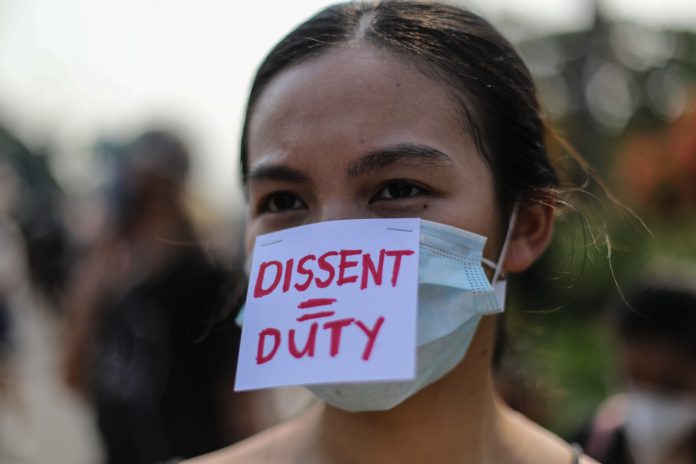Of late, a top general the who heads a regional command of the Armed Forces of the Philippines and is concurrent spokesman of the National Task Force to End Communist Local Armed Conflict has gone on the warpath against three celebrity women who have openly spoken out in defense of women’s rights, practically accusing them as sympathizers of the underground rebel movement.
The same general has also alleged that six members of the Makabayan (Nationalist) bloc in Congress are “card-carrying members of the Communist Party of the Philippines,” without offering any proof.
He has likewise accused the Mayor of Manila and the Governor of Cavite province of taking the side of communist rebels after they openly protested the putting up of posters in various locations within their jurisdictions declaring the rebels as “persona non grata.”
Even as the general has been admonished by no less than the Secretary of National Defense and lately, by the President himself, to avoid reckless accusations against certain personalities without offering solid evidence of involvement in the rebel underground, it would appear that the army official is bent on whipping up an anti-communist and anti-terrorist hysteria to make Filipinos turn against those merely criticizing the government and pointing out systemic corruption and human rights violations by state security forces.
What is happening here now is just one aspect of what appears to be a double-barreled attack on Philippine democracy from within.
We have what’s reminiscent of the Cold War-era anti-communist hysteria in the United States stoked by Sen. Joseph McCarthy who accused, without offering any proof, labor organizations and even Hollywood personalities as fellow travelers of the Communist Party, if not card-carrying Party members themselves.
Our own Congress embarked on a similar anti-communist witch-hunt in the 1950s, with the so-called Committee on Un-Filipino Activities (CUFA) taking the same tack and accusing people, without offering any solid proof, of involvement in alleged communist activities simply because they harbored anti-American sentiments or protested corruption and social injustice.
The anti-communist hysteria now being whipped up by the military and the civilian government in conjunction with the implementation of a draconian Anti-Terror Law—with its vague and overbroad definition of who is a terrorist—should be cause for serious concern by those who still believe that we should uphold our democratic system of government and oppose any form of return to authoritarian rule.
The Red-tagging of vocal critics of the Duterte administration is deeply disturbing as it gives state security forces carte blanche authority to go after those who advocate even peaceful reforms in Philippine society.
In the context of the Anti-Terrorism Law now in place that gives the police and the military the widest leeway in arresting without warrant and detaining for a longer period those they consider as terrorists on the basis of mere suspicion, there is now emerging a clear pattern of fomenting an anti-communist and anti-terrorist hysteria to pave the way for the government to silence critics and human rights advocates, including those from the Church.
We must point out that the Ramos administration has already repealed Republic Act 1700 or the Anti-Subversion Act of 1957 that declared mere membership in the Communist Party as illegal. Hence, what the law now declares as illegal is sedition and rebellion, or actually taking up arms against the government. The Revised Penal Code already punishes sedition and rebellion with lengthy prison terms.
The military itself acknowledges that the New People’s Army (NPA) is a spent force, having decreased in number from a high of 25,000 in the 1980s to only around 4,000-5,000 at present. Ranged against this “spent force” is the whole security apparatus of the State: army, air force, navy, Marines, as well as the 200,000-member national police force, not to mention paramilitary forces as well as village-level watchmen. If we add up the government’s total manpower as well as firepower, the government already enjoys a 10:1 ratio in the battlefield, yet has not been able to decisively defeat the armed insurgency even after 50 years.
We therefore ask: If the NPA is already a spent force, why is the government even spending more than Php16 billion next year for the NTF-ECLAC? Under the plan, Php20 million would be given each barangay or village already cleared of armed insurgents and their mass base. Part of the money, we’re told, would be given to rebel surrenderees as livelihood assistance. Local peace talks may sound fine in theory, but of doubtful effectiveness in practice at the ground level as the rebels operate under central supervision.
What we are worried about is the possibility that the current anti-communist and anti-terrorist hysteria could result in a killing frenzy like what happened in Indonesia in late 1965 and early 1966 where an estimated 500,000 to one million people suspected of being members and sympathizers of the Communist Party were killed by the military, paramilitary groups and youth and Muslim organizations, apparently with the backing of Western powers then as part of the Cold War.
We therefore ask: Why doesn’t the government, including the military, focus instead on the resumption of the stalled peace talks with the CPP-NPA-NDF so that the two sides can address the roots of armed conflict, which are poverty and social injustice, restore peace and pursue serious socio-economic development in the countryside after more than half a century of fighting?
Ernesto M. Hilario writes on political and social justice issues for various publications in the Philippines. The views and opinions expressed in this article are those of the author and do not necessarily reflect the official editorial position of LiCAS.news.









